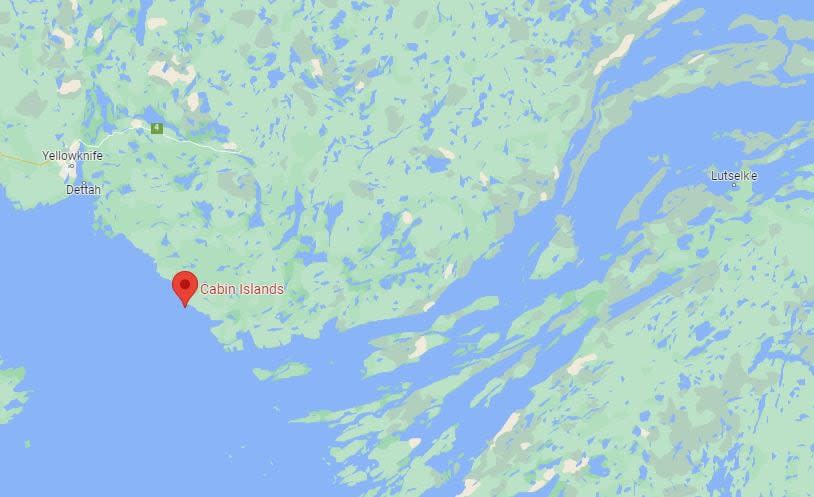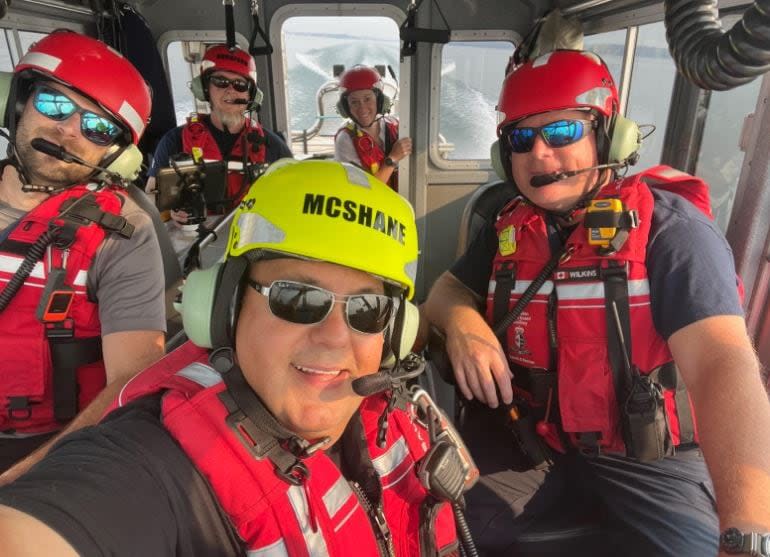Pepperoni, peanuts, and a paddle: boaters urge others to be more prepared after Great Slave Lake rescue

A pair of boaters successfully rescued after spending three days lost on Great Slave Lake are hoping their story will remind others to be prepared before heading out on the land or the water — even for short trips.
Samuel Roberts, 65, and Mark Elson, 51, only planned to be out fishing for a couple of hours on Thursday. They said they had no shelter, no emergency communication device and very little food with them — supplies that would have made for a faster rescue and a more comfortable wait when they realized they didn't know where they were.
"We had planned to go to the North Arm, because Mark has got to go fishing for his restaurant, so we were going to go check out a few spots and just come back home," explained Roberts. Elson is a co-owner of Bullock's Bistro in Yellowknife.
But it became smoky and foggy, and the men became disoriented.
They spent their first night sleeping on rocks on an island, with Elson regularly fetching driftwood for a fire to keep warm. The following day, when the air cleared, Roberts said they couldn't recognize anything.
"We had no idea that we crossed over the Dettah side and [were] headed to the East Arm," said Elson.

The Yellowknife unit of the Canadian Coast Guard Auxiliary said the men were found on Cabin Islands on the shore of Great Slave Lake. (Google Maps)
Both men admit they were entirely unprepared for the situation. They had a lighter to start a fire, and a pair of pepperoni sticks and a bag of peanuts — which they tried to eat sparingly. On the second night, they were able to kill a grouse.
"We killed one with a rock, but we had to use our paddle to finish him off," said Roberts.
"But that was after like 60 rocks, right, our aim is not very good," laughed Elson.
"I didn't have enough cigarettes … I didn't have a smoke for two days, but in that case you had other things to worry about without having to worry about cigarettes," added Roberts.
How many marine rescues happen per year?
On the heels of a successful rescue mission, the men and a volunteer search and rescue organization team who helped bring them home are reminding people how to avoid ending up in a similar situation.
Brian McShane, who leads the Yellowknife unit of the Canadian Coast Guard Auxiliary, said it's important to make someone aware of your trip plan and to bring emergency supplies and a communication device — even if the venture is supposed to be a short one.
"It doesn't matter [if you're] snowmobiling, cross country skiing, snowshoeing, boating — it's all the same," he said.

Brian McShane, leader of the Yellowknife unit of the Canadian Coast Guard Auxiliary, with fellow volunteers during a training exercise. He is surrounded by, from left to right, Brandon Hancock, Dale Durnford, Leslie Gray and Rob Wilkins. McShane said 15 members of the 38-member Yellowknife unit helped in the recent rescue of missing boaters on Great Slave Lake. (Brian McShane)
McShane said Yellowknife's auxiliary unit is involved in about a dozen open water rescues on Great Slave Lake per year, while the Hay River unit averages three or four. People don't hear about the missions as often as they used to, he explained, because of a rise in the use of emergency communication devices — now, search and rescue teams usually know exactly where they're going and what the situation is.
Seeing military aircraft like 'seeing your firstborn'
On Saturday, the men found a cabin to take shelter in.
"Mark said to me, 'Oh, we're going to have some sleep tonight,' and all of a sudden the plane showed up. Everything was cancelled," Roberts chuckled.
McShane said the Civil Air Search and Rescue Association found the men first, on the Cabin Islands. Elson said the Ahmic Air aircraft circled over the island for a while, before departing for fuel.
Then, said Elson, the military's Hercules aircraft came in.
"The feeling for me, seeing that Hercules, it's almost like seeing your first born. The joy was overwhelming inside. It was pretty cool when that happened," Elson said.
He said a two-way radio was dropped from the plane in a parachute, allowing the men to communicate with those on board. A pair of hunters in another boat reached them as well, giving them water and sandwiches and — eventually — a ride out to the Canadian Coast Guard Auxiliary vessel that brought them home.
Elson said the homecoming was a blur.
"I'm a pretty emotional kind of a guy, lots of tears from myself, but the conversations at that point I can't recall what we talked about. I was just glad to be safe and home."
Roberts said his kids had been more worried than he was — a comment that drew a friendly rib from Elson: "[Roberts] doesn't panic and stuff because he's old school, he's just learning now what feelings are in a situation like this."


